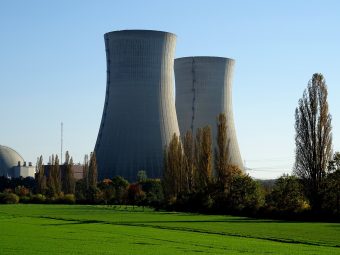
In the week Britain exports electricity to France for first time in four years, Gérard Magnin says renewable power will match Hinkley Point C on cost.
Gérard Magnin, who called Hinkley “very risky” when he resigned as a board member over the project in July, told the Guardian that with more than a dozen French reactors closed over safety checks and routine maintenance, circumstances for the state-owned EDF had deteriorated since he stepped down.
The closures have seen Britain this week exporting electricity to France for the first time in four years. An industry report on Tuesday also warned that the offline reactors could lead to a “tense situation” for energy supply in France, in the event of a cold snap this winter.
The situation is likely to be exacerbated by damage during Storm Angus to the main cable that carries electricity back and forth between the UK and France. It is believed a boat dropping anchor during the storm may have been responsible but National Grid is investigating the cause and working to repair the Interconnexion France-Angleterre, which is buried in the seabed and heavily armoured.
The operator said that four of the eight cables in the interconnector had been damaged, reducing its capacity from 2,000MW to 1,000MW until February next year. It added that due to the French reactor closures, it had already factored in a reduction in energy supplies from France this winter.
Magnin said that instead of backing new nuclear, the UK and France should capitalise on falling wind and solar power costs and help individuals and communities to build and run their own renewable energy projects. He founded an association of cities switching to green energy, joined the EDF board in 2014, and is now director of a renewable energy co-op in France.
“The most surprising [thing] for me is the attitude of the UK government which accepts the higher cost of electricity … in a time where the costs of renewables is decreasing dramatically,” he said. “In 10 years [when Hinkley Point C is due to be completed], the cost of renewables will have fallen again a lot.”
Of the Hinkley C design, known as the European Pressurised Reactor (EPR), Magnin said: “A lot of people in EDF have known for a long time the EPR has no future – too sophisticated, too expensive – but they assume their commitments and try to save the face of France.”
The UK’s business department conceded in September that by the time Hinkley is operational the price of electricity guaranteed to EDF will be above the comparable costs for large-scale solar and onshore windfarms. Officials argued that using renewables instead would cost more in grid upgrades and balancing the intermittent nature of wind and solar.
“Identifying the problems facing France and the UK this winter only goes to highlight the importance of investing in new capacity. Events across the Channel have shown that relying on old capacity is risky, with France’s nuclear plants proving as unreliable as our coal-fired ones,” said Dr Jonathan Marshall, an energy analyst at the Energy and Climate Intelligence Unit, a UK-based thinktank.
“At home, turning to old and dirty coal plants is not a long-term solution, so encouraging investment in new lower-carbon kit – solar, wind and a small amount of new gas capacity – should be at the top of the government’s list of priorities.”
Source: theguardian.com



